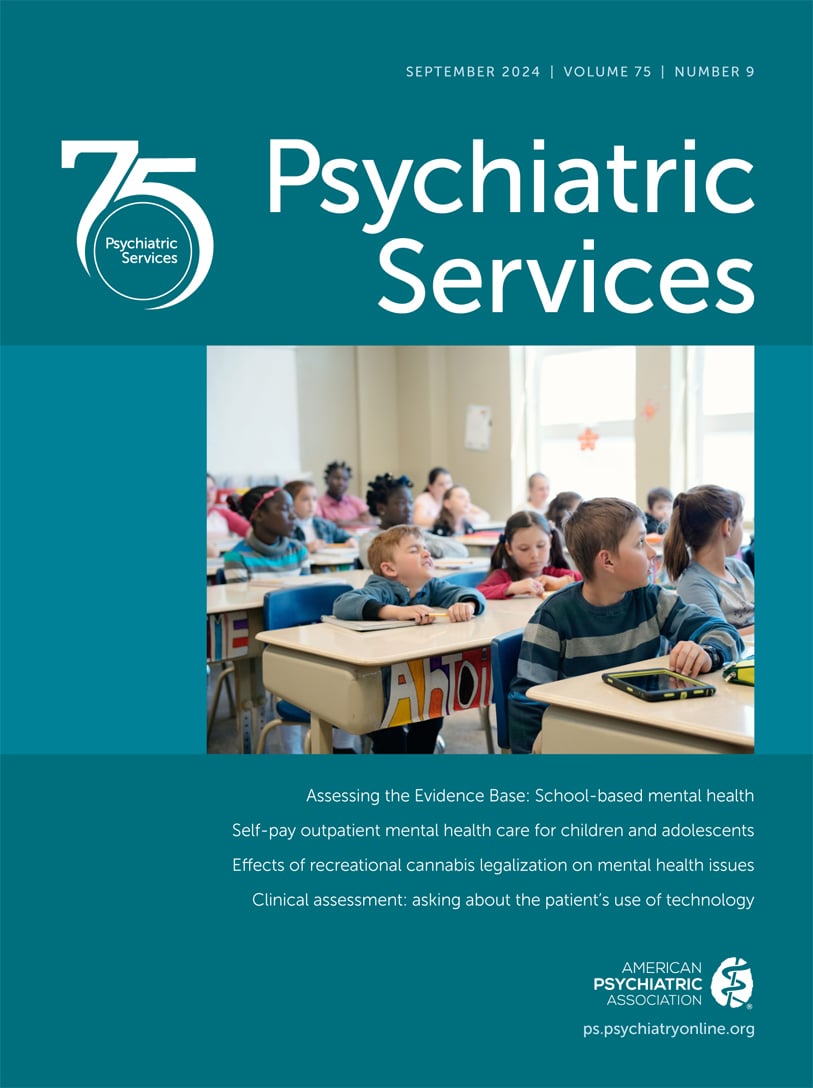Psychiatric Services
- Volume 46
- Number 11
- November 1995
Publication date: 01 November 1995
Pages1131–1139OBJECTIVES: The study examined relationships between specific treatment elements and their costs and ten outcome measures using data from a longitudinal outcome study of a Veterans Affairs program for homeless mentally ill veterans. METHODS: Baseline and ...
https://doi.org/10.1176/ps.46.11.1131Publication date: 01 November 1995
Pages1139–1143OBJECTIVE: The study compared patterns of previous mental health service use among 100 homeless men with schizophrenia and 100 men with schizophrenia who had never been homeless and explored whether differences in use of services were related to severity ...
https://doi.org/10.1176/ps.46.11.1139Publication date: 01 November 1995
Pages1144–1148OBJECTIVES: The study examined the usefulness of a three-perspective model for determining the quality of evaluations in psychiatric emergency services. The model was used to evaluate the hypothesis that the provision of high-quality care in emergency ...
https://doi.org/10.1176/ps.46.11.1144Effects of parental involvement on the functioning of noninstitutionalized adults with schizophrenia
Publication date: 01 November 1995
Pages1149–1155OBJECTIVES: The study described the nature and extent of parental families' involvement with adult children with schizophrenia who lived in noninstitutional settings in the community and examined the association between families' involvement and the adult ...
https://doi.org/10.1176/ps.46.11.1149Publication date: 01 November 1995
Pages1156–1160OBJECTIVE: This study sought to describe factors associated with adaptive coping by family members with a psychiatrically disabled relative. METHODS: A total of 225 family members of persons with serious mental illness were interviewed. Hierarchical ...
https://doi.org/10.1176/ps.46.11.1156Publication date: 01 November 1995
Pages1161–1165OBJECTIVE: The study examined whether rehospitalization of patients with severe and persistent mental illness could be predicted by patients' quality of life. The predictive ability of two clinical factors associated with rehospitalization--history of ...
https://doi.org/10.1176/ps.46.11.1161Publication date: 01 November 1995
Pages1166–1171OBJECTIVE: The authors reviewed the literature to better understand pathways to psychiatric care among young persons experiencing a first episode of psychosis. Because no discrete body of literature exists about how young people with psychotic illness ...
https://doi.org/10.1176/ps.46.11.1166Publication date: 01 November 1995
Pages1172–1177The authors describe an approach to training staff in psychiatric rehabilitation programs that is based on principles of organizational psychology. The approach promotes two shifts in the focus of training. First, training efforts should not only educate ...
https://doi.org/10.1176/ps.46.11.1172Publication date: 01 November 1995
Pages1178–1184OBJECTIVE: To determine the effects of Medicare's prospective payment system (PPS) on hospital care, changes in length of stay and intensity of clinical services received by 2,746 depressed elderly patients in 297 acute care general medical hospitals were ...
https://doi.org/10.1176/ps.46.11.1178Article
Publication date: 01 November 1995
Pages1187–1188During hospitalization and at one-year follow-up, 48 patients with a diagnosis of major depression completed the Inventory to Diagnose Depression and the Sickness Impact Profile (SIP). Overall change scores revealed statistically significant and ...
https://doi.org/10.1176/ps.46.11.1187Publication date: 01 November 1995
Pages1189–1191Twenty-two chronic psychiatric patients enrolled in a psychoeducational rehabilitation program were assessed before and after the program to determine whether participation decreased severity of psychopathology and improved community functioning and ...
https://doi.org/10.1176/ps.46.11.1189Publication date: 01 November 1995
Pages1191–1194Thirty-three inpatients (20 women and 13 men) with bipolar disorder participated in audiotaped, semi-structured interviews that focused on their informational needs in six areas: self-management of the disorder, understanding bipolar disorder, managing ...
https://doi.org/10.1176/ps.46.11.1191Article
Article
Past Issues
View Issues Archive
Vol. 75 | No. 12

Vol. 75 | No. 11

Vol. 75 | No. 10
